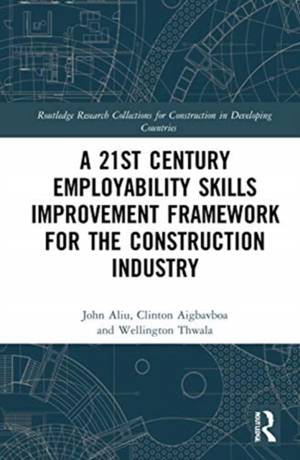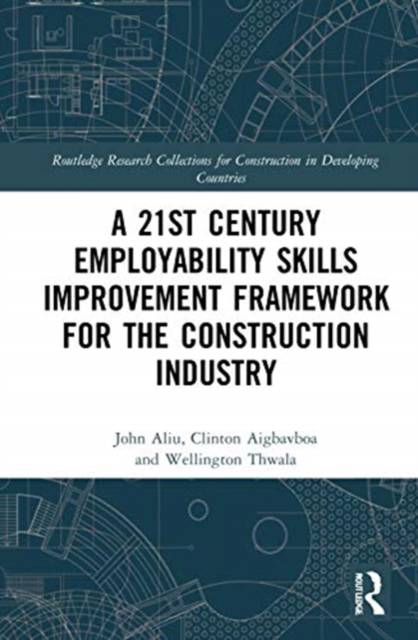
- Afhalen na 1 uur in een winkel met voorraad
- Gratis thuislevering in België vanaf € 30
- Ruim aanbod met 7 miljoen producten
- Afhalen na 1 uur in een winkel met voorraad
- Gratis thuislevering in België vanaf € 30
- Ruim aanbod met 7 miljoen producten
Zoeken
A 21st Century Employability Skills Improvement Framework for the Construction Industry
John Aliu, Clinton Aigbavboa, Wellington Thwala
€ 216,45
+ 432 punten
Omschrijving
This book will provide readers with an understanding of the employability concept and develop an employability skills improvement model to enhance the employability of built environment graduates to foster economic development. The developed model determines the influence of generic skills, discipline specific skills, work-integrated learning, emotional intelligence, university-industry collaboration outcomes and 4IR knowledge in predicting the outcomes of improved graduate employability. The model is developed with a theoretical lens on existing frameworks of employability and skills development. Whilst drawing comparisons with countries such as the UK, USA, Australia and Canada, the authors present the results of a two-stage Delphi survey in South Africa as a case study on the current state of skills development and on the skills of the future. The case study is presented in line with the South Africa's long-term National Development Plan (NDP) aimed at developing the key capabilities and skills of its citizens by ensuring quality education on a broader scale by 2030. As automation continues to rapidly advance, the pressures on universities to revamp and restructure their curricula have become increasingly necessary. This book recommends that higher education institutions urgently need to intensify their efforts by introducing significant modifications to the science and technology curriculum to enable students to develop and acquire competencies in the rapidly emerging areas of artificial intelligence, data science, robotics, advanced simulation, data communication, system automation, real-time inventory operations, cloud computing, and information technologies. This implies that universities' curriculum should be infused with 4IR thinking within the conventional primary sciences of biology, chemistry, and physics, with greater emphasis on digital literacy to boost 4IR understanding amongst the graduates. The book is therefore of interest to researchers and policy makers in the built environment that are placed in academia, the construction industry or at consultancy levels, it provides significant recommendations for universities as they intensify their efforts to develop graduates for the future.
Specificaties
Betrokkenen
- Auteur(s):
- Uitgeverij:
Inhoud
- Aantal bladzijden:
- 252
- Taal:
- Engels
- Reeks:
Eigenschappen
- Productcode (EAN):
- 9780367684013
- Verschijningsdatum:
- 9/04/2021
- Uitvoering:
- Hardcover
- Formaat:
- Genaaid
- Afmetingen:
- 160 mm x 244 mm
- Gewicht:
- 566 g

Alleen bij Standaard Boekhandel
+ 432 punten op je klantenkaart van Standaard Boekhandel
Beoordelingen
We publiceren alleen reviews die voldoen aan de voorwaarden voor reviews. Bekijk onze voorwaarden voor reviews.











